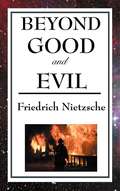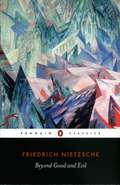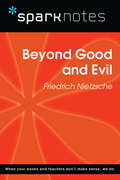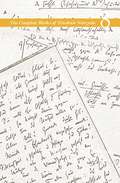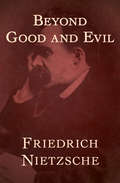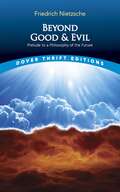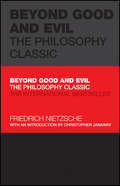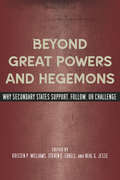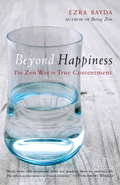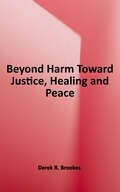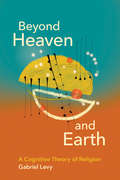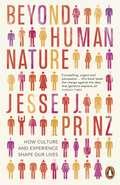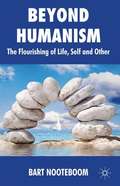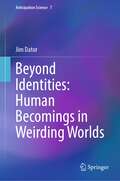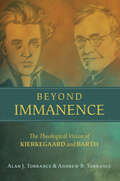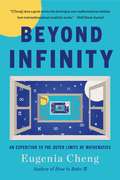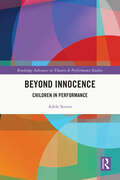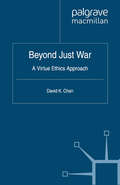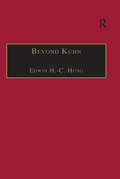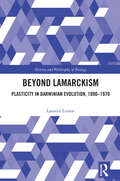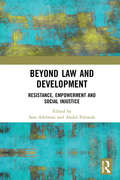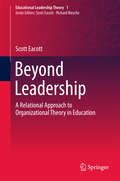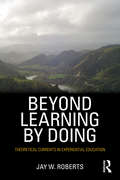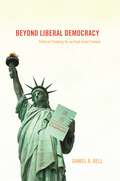- Table View
- List View
Beyond Good and Evil
by Friedrich NietzscheIn Beyond Good and Evil, Nietzsche attacks past philosophers for their alleged lack of critical sense and their blind acceptance of the Christian premises in their consideration of morality. The work attempts to move "beyond good and evil," in the sense of leaving behind the traditional morality which Nietzsche subjects to a destructive critique in favor of what he regards as an affirmative approach that fearlessly confronts the perspectival nature of knowledge and the perilous condition of the modern individual.
Beyond Good and Evil
by Friedrich Nietzsche'One of the greatest books of a very great thinker' Michael TannerBeyond Good and Evil confirmed Nietzsche's position as the towering European philosopher of his age. The work dramatically rejects traditional Western thought with its notions of truth and God, good and evil. Nietzsche seeks to demonstrate that the Christian world is steeped in a false piety and infected with a 'slave morality'. With wit and energy, he turns from this critique to a philosophy that celebrates the present and demands that the individual impose their own 'will to power' upon the world.Translated by R. J. HOLLINGDALE With an Introduction by MICHAEL TANNER
Beyond Good and Evil (SparkNotes Philosophy Guide)
by SparkNotesBeyond Good and Evil (SparkNotes Philosophy Guide) Making the reading experience fun! SparkNotes Philosophy Guides are one-stop guides to the great works of philosophy–masterpieces that stand at the foundations of Western thought. Inside each Philosophy Guide you&’ll find insightful overviews of great philosophical works of the Western world.
Beyond Good and Evil / On the Genealogy of Morality
by Friedrich Nietzsche Adrain Del CanBeyond Good and Evil is Nietzsche's first sustained philosophical treatment of issues important to him. Unlike the expository prose of the essayistic period (1872-76), the stylized forays and jabs of the aphoristic period (1878-82), and the lyrical-philosophical rhetoric of the Zarathustra-period (1882-85), Beyond Good and Evil inscribes itself boldly into the history of philosophy, challenging ancient and modern notions of philosophy's achievements and insisting on a new task for "new philosophers. " This is a watershed book for Nietzsche and for philosophy in the modern era. On the Genealogy of Morality applies Nietzsche's celebrated genealogical method, honed in the earlier aphoristic writings, to the problem of morality's influence on the human species. In three treatises that strikingly anticipate insights appearing much later in Freud's Civilization and Its Discontents (1930), Nietzsche provides an anthropological psychograph of our species, revealing the origins of the concepts of good and evil, the roles played by guilt and bad conscience, and the persistence of ascetic ideals. Manifesting a hopeful yet unsentimental assessment of the human condition, these books resonated throughout the 20th century and continue to exert broad appeal.
Beyond Good and Evil: Prelude To A Philosophy Of The Future (Barnes And Noble Library Of Essential Reading Ser.)
by Friedrich NietzscheFriedrich Nietzsche's trailblazing, incendiary book sets dogmatic philosophy and traditional morality alight One of the most important works in philosophical history, Beyond Good and Evil consists of 296 sections and a final "aftersong." Therein, Nietzsche articulates his views on philosophy, philosophers, morality, religion, society, people, and culture. As challenging as it is rewarding, Beyond Good and Evil will command you, confront you, and provoke you into reconsidering your perception of the modern world. This ebook has been professionally proofread to ensure accuracy and readability on all devices.
Beyond Good and Evil: Prelude to a Philosophy of the Future (Dover Thrift Editions)
by Friedrich NietzscheAfter kicking open the doors to twentieth-century philosophy in Thus Spake Zarathustra, Friedrich Nietzsche refined his ideal of the superman with the 1886 publication of Beyond Good and Evil. Conventional morality is a sign of slavery, Nietzsche maintains, and the superman goes beyond good and evil in action, thought, and creation. Nietzsche especially targets what he calls a "slave morality" that fosters herdlike quiescence and stigmatizes the "highest human types."In this pathbreaking work, Nietzsche's philosophical and literary powers are at their height: with devastating irony and flashing wit he gleefully dynamites centuries of accumulated conventional wisdom in metaphysics, morals, and psychology, clearing a path for such twentieth-century innovators as Thomas Mann, André Gide, Sigmund Freud, George Bernard Shaw, André Malraux, and Jean-Paul Sartre, all of whom openly acknowledged their debt to him.Students of philosophy and literature as well as general readers will prize this rich sampling of Nietzsche's thought in an unabridged and inexpensive edition of one of the philosopher's most important works.
Beyond Good and Evil: The Philosophy Classic (Capstone Classics)
by Friedrich NietzscheA deluxe, high-quality edition of Friedrich Nietzsche’s seminal work Beyond Good and Evil is one of the final books by German philosopher Friedrich Nietzsche. This landmark work continues to be one of the most well-known and influential explorations of moral and ethical philosophy ever conceived. Expanding on the concepts from his previous work Thus Spoke Zarathustra, Nietzsche adopts a polemic approach to past philosophers who, in his view, lacked critical sense in accepting flawed premises in their consideration of morality. The metaphysics of morality, Nietzsche argues, should not assume that a good man is simply the opposite of an evil man, rather merely different expression of humanity’s common basic impulses. Controversial in its time, as well as hotly debated in the present, Nietzsche’s work moves beyond conventional ethics to suggest that a universal morality for all human beings in non-existent – perception, reason and experience are not static, but change according to an individual’s perspective and interpretation. The work further argues that philosophic traditions such as “truth,” “self-consciousness” and “free will” are merely inventions of Western morality and that the “will to power” is the real driving force of all human behaviour. This volume: Critiques the belief that actions, including domination or injury to the weak, can be universally objectionable Explores themes of religion and “master and slave” morality Includes a collection of stunning aphorisms and observations of the human condition Part of the bestselling Capstone Classics Series edited by Tom Butler-Bowdon,this collectible, hard-back edition of Beyond Good and Evil provides an accessible and insightful Introduction by leading Nietzsche authority Dr Christopher Janaway. This deluxe volume is perfect for anyone with interest in philosophy, psychology, science, history and literature.
Beyond Great Powers and Hegemons: Why Secondary States Support, Follow, or Challenge
by Kristen Williams Steven E. Lobell Neal G. JesseThis book adds a new dimension to the discussion of the relationship between the great powers and the weaker states that align with them--or not. Previous studies have focused on the role of the larger (or super) power and how it manages its relationships with other states, or on how great or major powers challenge or balance the hegemonic state. Beyond Great Powers and Hegemons seeks to explain why weaker states follow more powerful global or regional states or tacitly or openly resist their goals, and how they navigate their relationships with the hegemon. The authors explore the interests, motivations, objectives, and strategies of these 'followers'-including whether they can and do challenge the policies and strategies or the core position of the hegemon. Through the analysis of both historical and contemporary cases that feature global and regional hegemons in Europe, Latin America, the Middle East, Africa, Asia, and South Asia, and that address a range of interest areas--from political, to economic and military--the book reveals the domestic and international factors that account for the motivations and actions of weaker states.
Beyond Happiness: The Zen Way to True Contentment
by Ezra BaydaMany books have been published in recent years on happiness. Ezra Bayda, a remarkably down-to-earth Zen teacher, believes that the happiness "boom" has been largely a bust for readers. Why? Because it's precisely the pursuit of happiness that keeps us trapped in cycles of dissatisfaction and suffering. In Beyond Happiness, Bayda draws on Zen teachings to question our conventional notions about what happiness is and where we can find it. Most of us seek happiness in things that are external to us. We imagine that getting more money, a better relationship, or going on a nice vacation will finally make us happy. But Bayda shows us that the deepest and most lasting form of happiness does not rely on external circumstance at all. Bayda offers Zen insights and practices that point readers toward the true sources of lasting happiness: mindfulness, compassion, gratitude, and generosity.
Beyond Harm: Toward Justice, Healing and Peace
by Derek R. BrookesWe have all been hurt by someone, in some cases very seriously. And we have all inflicted pain on someone else, even if it was unintended. The consequences have often been devastating, and continue to this day. We find ourselves 'stuck' in anger, fear, isolation, disbelief, bitterness, self-blame, denial, guilt, shame . . . the list is all too familiar. Our friends and family plead with us to 'move on' and 'put the past behind us'. But it's never that simple. There is no 'magic wand' that can instantly sweep away this kind of pain. <p><p>So what can we do? How can we find some peace? Is it possible to heal from what has happened? Would some kind of punishment make a difference? Do we need to forgive? Would an apology help? How can we find a way out of this agonising hurt and negativity? Will it ever be possible to 'make things right'? 'Beyond Harm' explores all of these questions, and offers a way forward. The first Part looks at what it means to be wronged, why it hurts so much. It sets out an explanation for why we react to wrongdoing in the ways that we do, so many of which only cause us more suffering and pain. And it offers an alternative: a kind of 'justice' that can bring the healing and peace that we crave. This is a response that honours our moral values and acknowledges our common humanity. It is also evidence-based: it takes seriously how we actually think and feel about wrongdoing. The second Part draws on the first by exploring what it would take for this alternative to become a reality. It shows how it is possible to 'make things right' by using a tried and tested practice called 'restorative justice', and what is needed for this approach to be safe and effective.
Beyond Heaven and Earth: A Cognitive Theory of Religion
by Gabriel LevyAn approach to understanding religion that draws on both humanities and natural science but rejects approaches that employ simple monisms and radical dualisms. In Beyond Heaven and Earth, Gabriel Levy argues that collective religious narratives and beliefs are part of nature; they are the basis for the formation of the narratives and beliefs of individuals. Religion grows out of the universe, but to make sense of it we have to recognize the paradox that the universe is both mental and material (or neither). We need both humanities and natural science approaches to study religion and religious meaning, Levy contends, but we must also recognize the limits of these approaches. First, we must make the dominant metaphysics that undergird the various disciplines of science and humanities more explicit, and second, we must reject those versions of metaphysics that maintain simple monisms and radical dualisms. Bringing Donald Davidson&’s philosophy—a form of pragmatism known as anomalous monism—to bear on religion, Levy offers a blueprint for one way that the humanities and natural sciences can have a mutually respectful dialogue. Levy argues that in order to understand religions we have to take their semantic content seriously. We need to rethink such basic concepts as narrative fiction, information, agency, creativity, technology, and intimacy. In the course of his argument, Levy considers the relation between two closely related semantics, fiction and religion, and outlines a new approach to information. He then applies his theory to discrete cases: ancient texts, modern media, and intimacy.
Beyond Human Nature: How Culture and Experience Shape Our Lives
by Jesse J PrinzIn this provocative, revelatory tour de force, Jesse Prinz reveals how the cultures we live in - not biology - determine how we think and feel. He examines all aspects of our behaviour, looking at everything from our intellects and emotions, to love and sex, morality and even madness. This book seeks to go beyond traditional debates of nature and nurture. He is not interested in finding universal laws but, rather, in understanding, explaining and celebrating our differences. Why do people raised in Western countries tend to see the trees before the forest, while people from East Asia see the forest before the trees? Why, in South East Asia, is there a common form of mental illness, unheard of in the West, in which people go into a trancelike state after being startled? Compared to Northerners, why are people in the American South more than twice as likely to kill someone over an argument? And, above all, just how malleable are we?Prinz shows that the vast diversity of our behaviour is not engrained. He picks up where biological explanations leave off. He tells us the human story.
Beyond Humanism
by Bart NooteboomBeyond Humanism seeks to set humanism on a new footing. Enlightenment ideals of an autonomous, disconnected, and rational self are unrealistic. Together with Romantic dreams of authenticity and expression of the self it has had adverse effects, contributing to egotism and narcissism. Instead, this book employs a philosophy oriented towards the relationship between self and other. The book gives a critical discussion of religion, the Enlightenment and Romanticism. It seeks a way between Nietzsche's philosophy of the flourishing of life and Levinas's philosophy of the other. It argues that the self requires the other for its flourishing. The other is needed for the development of the self, for freedom also from the delusions and prejudices of the self, for transcendence of the self, for learning and innovation, for making sense in language, and for a life that aims not at a hereafter for the self but a hereafter that benefits others after one's death.
Beyond Identities: Human Becomings in Weirding Worlds (Anticipation Science #7)
by Jim DatorThis book is an argument for moving beyond culturally/historically/ethnically/biologically-grounded identity as the necessary foundation of an authentic self. It highlights examples of people who are attempting to inhabit identities they feel are more appropriate to themselves, by deploring the damage done via claims about authentic identity. The sole theme of this book is “becoming beyond identity”. We are not fixed human beings but rather perpetually-dynamic human becomings. As intelligence is enabled or recognized beyond the merely human, we should welcome our continuing evolution from homosapiens, sapiens, into many varieties of intelligences on Earth and the cosmos. This book builds from tiny ripples into a tsunami of examples from conventional identity studies, to Confucian human becomings, to apotemnophilia, to DIY biohacking, to cyborgs, to artilects, to hiveminds, to intelligence in animals, plants and fungi from the Holocene through the beginnings of the precarious, climate change-driven Anthropocene Epoch, with hints far beyond and throughout the cosmos. From a lifetime of work in future studies, anticipation science and space studies, the author balances frank tales of his own experiences and beliefs concerning his uncertain and fluid identities with those of others who tell their stories. In addition to material from academic and popular sources, a few poems further illuminate the scene.
Beyond Immanence: The Theological Vision of Kierkegaard and Barth (Kierkegaard as a Christian Thinker)
by Alan J. Torrance Andrew B. TorranceCritical insights into Kierkegaard&’s influence on Barth&’s theology. Karl Barth was often critical of Søren Kierkegaard&’s ideas as he understood them. But close reading of the two corpora reveals that Barth owes a lot to the melancholy Dane. Both conceive of God as infinitely qualitatively different from humans, and both emphasize the shocking nearness of God in the incarnation. As public intellectuals, they used this theological vision to protect Christocentric faith from political manipulation and compromise. For Kierkegaard, this meant criticizing the state church; for Barth, this entailed resisting Nazism. Meticulously crafted by a father-son team of renowned systematic theologians, Beyond Immanence demonstrates that Kierkegaard and Barth share a theological trajectory—one that resists cynical manipulation of Christianity for political purposes in favor of uncompromising devotion to a God who is radically transcendent yet established kinship with humanity in time.
Beyond Infinity: An Expedition to the Outer Limits of Mathematics
by Eugenia ChengThe hilarious and charming Eugenia Cheng leads us in search of what's bigger than infinity, and smaller than its oppositeImagine something small enough to fit in your head but too large to fit in the world-or even the universe. What would you call it? And what would it be? How about...infinity? In Beyond Infinity, musician, chef, and mathematician Eugenia Cheng answers this question by taking readers on a startling journey from math at its most elemental to its loftiest abstractions. Beginning with the classic thought experiment of Hilbert's hotel-the place where you can (almost) always find a room, if you don't mind being moved from room to room over the course of the night-she explores the wild and woolly world of the infinitely large and the infinitely small. Along the way she considers weighty questions like why some numbers are uncountable or why infinity plus one is not the same as one plus infinity. She finds insight in some unlikely examples: planning a dinner party for 7 billion people using a chessboard, making a chicken-sandwich sandwich, and creating infinite cookies from a finite ball of dough all tell you more about math than you could have imagined. An irresistible book on the universe's biggest possible topic, Beyond Infinity will beguile and bewitch you, and show all of us how one little symbol can hold the biggest idea of all.
Beyond Innocence: Children in Performance (ISSN)
by Adele SeniorOn a global platform we are witnessing the increased visibility of the people we call children and teenagers as political activists.Meanwhile, across the contemporary performance landscape, children are participating as performers and collaborators in ways that resonate with this figure of the child activist. Beyond Innocence: Children in Performance proposes that performance has the ability to offer alternatives to hegemonic perceptions of the child as innocent, in need of protection, and apolitical. Through an in-depth analysis of selected performances shown in the UK within the past decade, alongside newly gathered documentation on children’s participation in professional performance in their own words, this book considers how performance might offer more capacious representations of and encounters with children beyond the nostalgic and protective adult gaze elicited within mainstream contexts. Motivated by recent collaborations with children on stage that reimagine the figure of the child, the book offers a new approach to both reading age in performance and also doing research with children rather than on or about them. By redressing the current imbalance between the way that we read children and adults’ bodies in performance and taking seriously children’s cultures and experiences, Beyond Innocence asks what strategies contemporary performance has to offer both children and adults in order to foster shared spaces for social and political change. As such, the book develops an approach to analysing performance that not only recognises children as makers of meaning but also as historically, politically, and culturally situated subjects and bodies with lived experiences that far exceed the familiar narratives of innocence and inexperience that children often have to bear.
Beyond Just War: A Virtue Ethics Approach
by David K. ChanUnlike most books on the ethics of war, this book rejects the 'just war' tradition, proposing a virtue ethics of war to take its place. Like torture, war cannot be justified. It answers the question: 'If war is a very great evil, would a leader with courage, justice, compassion, and all the other moral virtues ever choose to fight a war?'
Beyond Kuhn: Scientific Explanation, Theory Structure, Incommensurability and Physical Necessity
by Edwin H.-C. HungThomas Kuhn's celebrated work, 'The Structure of Scientific Revolutions' revolutionized thinking in the philosophy of science and to a large extent his 'paradigm shift' view has replaced logical positivism and the philosophy of Karl Popper. This book goes beyond Kuhn by explicating the non-deductive notion of 'paradigm shift' in terms of the new concept of representational space. In doing so, Edwin H.-C. Hung is able to produce the first-ever unitary theory that solves the five central problems in the philosophy of science: scientific explanation, the structure of scientific theories, incommensurability, scientific change and physical necessity. The book identifies the main task of science as representing reality. This involves the construction of a representational space and the subsequent modeling of reality with configurations of 'objects' in that space. Newton's mechanics, Einstein's relativity and quantum mechanics, then, all serve as representational spaces. 'Beyond Kuhn' is a significant progression in scientific methodology. Other than serving as a sequel to Kuhn's 'Scientific Revolutions', it will be of great use in the fields of artificial intelligence, cognitive psychology and education.
Beyond Lamarckism: Plasticity in Darwinian Evolution, 1890-1970 (History and Philosophy of Biology)
by Laurent LoisonOver the past 20 years, the role of phenotypic plasticity in Darwinian evolution has become a hotly debated topic among biologists and philosophers of science. For instance, in the Extended Evolutionary Synthesis, a new form of evolutionary theory that aims to include processes not taken into account by standard theory (the Modern Synthesis), the question of the remarkable plasticity of living beings is central.Beyond Lamarckism: Plasticity in Darwinian Evolution, 1890–1970 shows that the evolutionary impact of plasticity was in fact debated long before the emergence of the current debate on the limits of the Modern Synthesis. The question of how the plasticity of organisms could play a causal role in Darwinian evolution was raised on two separate occasions: first, around 1900, with the emergence of the theory of “organic selection” and, second, during the formation of the Modern Synthesis itself, in the mid-20th century. Out of these reflections came a very large number of concepts, models, and many different terms (“organic selection”, “stabilizing selection”, “genetic assimilation”, “Baldwin effect”, etc.), which were often developed independently in various research traditions and empirical contexts. This book also looks at the reasons why these conceptions have been downplayed in the standard understanding of adaptive evolution.Showing the extraordinary complexity of this history, Beyond Lamarckism is aimed at readers interested in evolutionary theory, whether philosophers, biologists, or historians.
Beyond Law and Development: Resistance, Empowerment and Social Injustice
by Sam AdelmanThe book highlights new imaginaries required to transcend traditional approaches to law and development. The authors focus on injustices and harms to people and the environment, and confront global injustices involving impoverishment, patriarchy, forced migration, global pandemics and intellectual rights in traditional medicine resulting from maldevelopment, bad governance and aftermaths of colonialism. New imaginaries emphasise deconstruction of fashionable myths of law, development, human rights, governance and post-coloniality to focus on communal and feminist relationality, non-western legal systems, personal responsibility for justice and forms of resistance to injustices. The book will be of interest to students and scholars of development, law and development, feminism, international law, environmental law, governance, politics, international relations, social justice and activism.
Beyond Leadership: A Relational Approach to Organizational Theory in Education (Educational Leadership Theory)
by Scott EacottThis book systematically elaborates Scott Eacott’s “relational” approach to organizational theory in education. Contributing to the relational trend in the social sciences, it first surveys relational scholarship across disciplines before providing a nuanced articulation of the relational research program and key concepts such as organizing activity, auctors, and spatio-temporal conditions. It also includes critical commentaries on the program from key figures such as Tony Bush, Megan Crawford, Fenwick English, Helen Gunter, Izhar Oplatka, Augusto Riveros, and Dawn Wallin. As such, the text models an approach to, or social epistemology for building knowledge claims in relation rather than through parallel monologues.Eacott’s relational approach provides a distinctive, post-Bourdieusian variant of the relational sociological project. Shifting the focus of inquiry from entities (e.g., leaders, organizations) to organizing activity and recognizing how auctors generate – simultaneously emerging from and constitutive of – spatio-temporal conditions unsettles the orthodoxy of organizational theory in educational administration and leadership. By presenting its claims in the context of other approaches, the book stimulates intellectual debate among both relational sociologists and opponents of relational approaches. Beyond Leadership provides significant insights into the organizing of education. As it does not fit neatly into any one field, but instead blends educational administration and leadership, organizational studies, and relational sociology, among others, it charts new territory and promotes important dialogue and debate.
Beyond Learning by Doing: Theoretical Currents in Experiential Education
by Jay W. RobertsWhat is experiential education? What are its theoretical roots? Where does this approach come from? Offering a fresh and distinctive take, this book is about going beyond "learning by doing" through an exploration of its underlying theoretical currents. As an increasingly popular pedagogical approach, experiential education encompasses a variety of curriculum projects from outdoor and environmental education to service learning and place-based education. While each of these sub-fields has its own history and particular approach, they draw from the same progressive intellectual taproot. Each, in its own way, evokes the power of "learning by doing" and "direct experience" in the educational process. By unpacking the assumed homogeneity in these terms to reveal the underlying diversity of perspectives inherent in their usage, this book allows readers to see how the approaches connect to larger conversations and histories in education and social theory, placing experiential education in social and historical context.
Beyond Liberal Democracy: Political Thinking for an East Asian Context
by Daniel A. BellIs liberal democracy appropriate for East Asia? In this provocative book, Daniel Bell argues for morally legitimate alternatives to Western-style liberal democracy in the region. Beyond Liberal Democracy, which continues the author's influential earlier work, is divided into three parts that correspond to the three main hallmarks of liberal democracy--human rights, democracy, and capitalism. These features have been modified substantially during their transmission to East Asian societies that have been shaped by nonliberal practices and values. Bell points to the dangers of implementing Western-style models and proposes alternative justifications and practices that may be more appropriate for East Asian societies. If human rights, democracy, and capitalism are to take root and produce beneficial outcomes in East Asia, Bell argues, they must be adjusted to contemporary East Asian political and economic realities and to the values of nonliberal East Asian political traditions such as Confucianism and Legalism. Local knowledge is therefore essential for realistic and morally informed contributions to debates on political reform in the region, as well as for mutual learning and enrichment of political theories. Beyond Liberal Democracy is indispensable reading for students and scholars of political theory, Asian studies, and human rights, as well as anyone concerned about China's political and economic future and how Western governments and organizations should engage with China.

